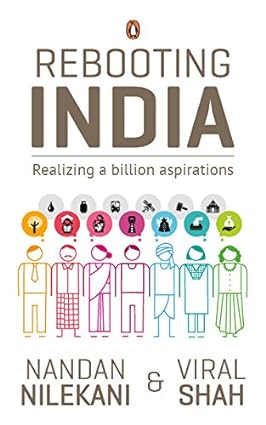Table of Contents
Introduction
Saurabh Mukherjea is the Founder and Chief Investment Officer of Marcellus Investment Managers. Saurabh was educated at the
Saurabh Mukherjea is the Founder and Chief Investment Officer of Marcellus Investment Managers. Saurabh was educated at the London School of Economics where he earned a BSc in Economics (with First Class Honours) and an MSc in Economics (with distinction in Macro & Microeconomics).
In London, Saurabh was the co-founder of Clear Capital and in 2007 he was rated by the Extel Survey as one of the top small-cap analysts in the UK. In India, Saurabh was rated as the leading equity strategist in 2015, 2016, and 2017 by the Asia Money polls. Prior to setting up Marcellus, Saurabh was the CEO of Ambit Capital.

1. Guns, Germs, and Steel by Jared Diamond :

Jared Diamond convincingly argues that geographical and environmental factors shaped the modern world. A major advance in our understanding of human societies, Guns, Germs, and Steel chronicles the way that the modern world came to be and stunningly dismantles racially based theories of human history.
Societies that had had a head start in food production advanced beyond the hunter-gatherer stage, and then developed religion –as well as nasty germs and potent weapons of war –and adventured on sea and land to conquer and decimate preliterate cultures.
2. I Too Had a Dream by Verghese Kurien :

This is the autobiography of Verghese Kurien, Dr Verghese Kurien graduated in science and engineering from Madras University and Michigan State University, US, respectively. Verghese also explains his struggle against two lazy, corrupt, and self-absorbed monolithic institutions of India – the bureaucrats and politicians.
The autobiography provides insights into India’s self-sufficiency in Milk for India. It shows how even a single determined individual can change the way we Indians perceive ourselves by sheer dedication and commitment towards his/her work and towards the country he/she lives in.
Here you see the commitment of an individual Dr Kurien towards farmers as another human being. He is motivated to better the lives of these farmers and finds ways to just do that and that way created history by starting WHITE REVOLUTION and has immortalized himself in the annals of Indian history.
3. The Mind is Flat: The Illusion of Mental Depth and The Improvised Mind by Nick Chater :

We are always conscious of the results of our interpretation of sensory information, and we are never conscious of the process by which these interpretations are created.
In The Mind Is Flat, pre-eminent behavioral scientist Nick Chater reveals that this entire enterprise is utterly misguided. Drawing on startling new research in neuroscience, behavioral psychology, and perception, he shows that we have no hidden depths to plumb, and unconscious thought is a myth.
We generate our ideas, motives, and thoughts at the moment. This revelation explains many of the quirks of human behavior – for example why our supposedly firm political beliefs, personal preferences, and even our romantic attractions are routinely proven to be inconsistent and changeable.
4. The Gifts of Athena: Historical Origins of the Knowledge Economy Joel Mokyr :

The growth of technological and scientific knowledge in the past two centuries has been the overriding dynamic element in the economic and social history of the world. Its result is now often called the knowledge economy. But what are the historical origins of this revolution and what have been its mechanisms?
In The Gifts of Athena, Joel Mokyr constructs an original framework to analyze the concept of “useful” knowledge. He argues that the growth explosion in the modern West in the past two centuries was driven not just by the appearance of new technological ideas but also by the improved access to these ideas in society at large–as made possible by social networks comprising universities, publishers, professional sciences, and kindred institutions.
Through a wealth of historical evidence set in clear and lively prose, he shows that changes in the intellectual and social environment and the institutional background in which knowledge was generated and disseminated brought about the Industrial Revolution, followed by sustained economic growth and continuous technological change.
5. Range: How Generalists Triumph in a Specialized World by David Epstein :

Plenty of experts argue that anyone who wants to develop a skill, play an instrument, or lead their field should start early, focus intensely, and rack up as many hours of deliberate practice as possible.
If you dabble or delay, you’ll never catch up to the people who got a head start. But a closer look at research on the world’s top performers, from professional athletes to Nobel laureates, shows that early specialization is the exception, not the rule.
David Epstein examined the world’s most successful athletes, artists, musicians, inventors, forecasters, and scientists. He discovered that in most fields–especially those that are complex and unpredictable–generalists, not specialists, are primed to excel.
Generalists often find their path late, and they juggle many interests rather than focusing on one. They’re also more creative, more agile, and able to make connections their more specialized peers can’t see.
Provocative, rigorous, and engaging, Range makes a compelling case for actively cultivating inefficiency. Failing a test is the best way to learn. Frequent quitters end up with the most fulfilling careers.
The most impactful inventors cross domains rather than deepening their knowledge in a single area. As experts silo themselves further while computers master more of the skills once reserved for highly focused humans, people who think broadly and embrace diverse experiences and perspectives will increasingly thrive.
6. A Wealth of Common Sense: Why Simplicity Trumps Complexity in Any Investment Plan by Ben Carlson :

The book shows you how a simplicity-based framework can lead to better investment decisions. The financial market is a complex system, but that doesn’t mean it requires a complex strategy; in fact, this false premise is the driving force behind many investors’ market “mistakes.” Information is important, but understanding and perspective are the keys to better decision-making.
This book describes the proper way to view the markets and your portfolio and shows you the simple strategies that make investing more profitable, less confusing, and less time-consuming. Without the burden of short-term performance benchmarks, individual investors have the advantage of focusing on the long view, and the freedom to construct the kind of portfolio that will serve their investment goals best.
This book proves how complex strategies essentially waste these advantages, and provides an alternative game plan for those ready to simplify.
Complexity is often used as a mechanism for talking investors into unnecessary purchases when all most need is a deeper understanding of conventional options. This book explains which issues you actually should pay attention to, and which ones are simply used for an illusion of intelligence and control.
Keep up with or beat professional money managers Exploit stock market volatility to your utmost advantage Learn where advisors and consultants fit into smart strategy Build a portfolio that makes sense for your particular situation
You don’t have to outsmart the market if you can simply outperform it. Cut through the confusion and noise and focus on what actually matters. A Wealth of Common Sense clears the air, and gives you the insight you need to become a smarter, more successful investor.
7. The Myth of Capitalism: Monopolies and the Death of Competition by Jonathan Tepper :

The Myth of Capitalism tells the story of how America has gone from an open, competitive marketplace to an economy where a few very powerful companies dominate key industries that affect our daily lives. Digital monopolies like Google, Facebook, and Amazon act as gatekeepers to the digital world. Amazon is capturing almost all online shopping dollars.
We have the illusion of choice, but for most critical decisions, we have only one or two companies, when it comes to high-speed Internet, health insurance, medical care, mortgage title insurance, social networks, Internet searches, or even consumer goods like toothpaste.
Every day, the average American transfers a little of their paycheck to monopolists and oligopolists. The solution is vigorous anti-trust enforcement to return America to a period where competition created higher economic growth, more jobs, higher wages, and a level playing field for all.
The Myth of Capitalism is the story of industrial concentration, but it matters to everyone because the stakes could not be higher. It tackles the big questions: why is the US becoming a more unequal society, why is economic growth anemic despite trillions of dollars of federal debt and money printing, why the number of start-ups has declined, and why are workers losing out?
8. The Rise and Fall of American Growth: The U.S. Standard of Living since the Civil War (The Princeton Economic History of the Western World Book 70) :

In the century after the Civil War, an economic revolution improved the American standard of living in ways previously unimaginable. Electric lighting, indoor plumbing, motor vehicles, air travel, and television transformed households and workplaces. But has that era of unprecedented growth come to an end?
Weaving together a vivid narrative, historical anecdotes, and economic analysis, The Rise and Fall of American Growth challenges the view that economic growth will continue unabated and demonstrates that the life-altering scale of innovations between 1870 and 1970 cannot be repeated.
Robert Gordon contends that the nation’s productivity growth will be further held back by the headwinds of rising inequality, stagnating education, an aging population, and the rising debt of college students and the federal government and that we must find new solutions.
A critical voice in the most pressing debates of our time, The Rise and Fall of American Growth is at once a tribute to a century of radical change and a harbinger of tougher times to come.
9. Zero to One: Notes on Start-Ups, or How to Build the Future :

Peter Theal has been a close acquaintance of Musk both members of what is now known as the PayPal mafia they both got rich from the sale of PayPal and ended up launching incredible companies afterward Zero to One is a phenomenal and easy-to-read book which we can’t recommend enough it’s short it’s to the point and heels perspective on how new companies are the change agent for the world.
Which is very relatable to those with an entrepreneurial mindset it’s easy to see how these two could come together on a mutual project despite sometimes their differences in the vision there’s a great deal of respect between the two of them and they are easily two of our favorite entrepreneurs Peter theal isn’t mainstream popular but we recommend you look into who he is and what he’s working on you’ll have your mind.
10. The Outsiders: Eight Unconventional CEOs And Their Radically Rational Blueprint For Success by Thorndike :

The Outsiders details the extraordinary success of CEOs who took a radically different approach to corporate management. In this refreshing, counterintuitive book, author Will Thorndike brings the analytical wisdom of a successful career in investing, closely by evaluating the performance of companies and their leaders.
Thorndike talks about eight individualistic CEOs whose firms’ average returns outperformed the S&P 500 by a factor of twenty in other words, an investment of $10,000 with each of these CEOs, on average, would have been worth over $1.5 million twenty-five years later. Some of the companies on this list are highly recognizable names like The Washington Post Company, Berkshire Hathaway, General Dynamics, and more.
Humble, unassuming, and often frugal, these “outsiders” shunned Wall Street and the press, and shied away from the hottest new management trends.
This book is a must-read to learn the traits and methods striking for their consistency and relentless rationality that helped these unique leaders achieves such exceptional performance.
11. Competition Demystified: A Radically Simplified Approach to Business Strategy by Bruce C. Greenwald (Author), Judd Kahn (Author) :

One of the best strategy books out there. Unlike Porter who defines competition equally through 5 forces, Greenwald prioritizes one force: the barrier to entry for defining competition. This prioritization helps design a competitive strategy more practical.
What makes this book a great read is the fact that Greenwald uses many real-world competitive situations (Wal-Mart, Microsoft, Apple, Polaroid, etc.) to illustrate the framework’s applicability.
The biggest merit of this book is the investment valuation approach described in the last part of the book. This investment valuation approach is a powerful alternative to the established valuation models (e.g. Discounted-Cashflow-Model) used in today’s financial world because it includes the importance of strategic decision-making in the valuation process.
12. One Up On Wall Street: How to Use What You Already Know to Make Money in the Market by Lynch (Author) :

Peter Lynch breaks the stereotypes related to what being a good investor consists of, and how anyone can beat renowned investors by using logic and common sense as their main analysis metrics. It all comes down to putting your money into the companies that you understand.
13. Financial Shenanigans: by Howard M. Schilit (Author), Jeremy Perler (Author) :

“Financial Shenanigans, Third Edition” is a book written by Howard M. Schilit and Jeremy Perler. The book focuses on uncovering accounting gimmicks and tricks used by companies to manipulate their financial statements.
It provides practical examples and case studies to help readers understand how to detect and analyze financial fraud. This third edition includes updated information on recent accounting scandals, new financial reporting standards, and additional examples of financial shenanigans
14. Rebooting India: Realizing a Billion Aspirations Book by Nandan Nilekani and Viral Shah :

“Rebooting India: Realizing a Billion Aspirations” is a non-fiction book written by Nandan Nilekani and Viral Shah. The book explores the potential of India’s digital infrastructure to drive economic growth and improve the lives of its citizens. The authors argue that by leveraging technology, India can overcome its challenges and create a more inclusive and prosperous society.
The book is divided into three parts. The first part provides an overview of India’s history and economic development, highlighting the opportunities and challenges that the country faces. The second part delves into the specifics of India’s digital infrastructure, including the Aadhaar biometric ID system, the Unified Payments Interface (UPI), and other initiatives designed to improve access to financial services and streamline government programs.
The third part of the book focuses on the potential of digital technology to transform India’s healthcare system, education system, and other areas of public life.
Overall, “Rebooting India” offers a hopeful and optimistic vision for India’s future. The authors argue that by embracing technology and innovation, India can overcome its challenges and build a brighter future for all of its citizens. The book is a must-read for anyone interested in the potential of technology to drive social and economic change.
15. Shapers of Business Institutions: How Deepak Parekh Grew HDFC Group Exponentially :

“Shapers of Business Institutions: How Deepak Parekh Grew HDFC Group Exponentially” is a book that provides rare insights into the story of Deepak Parekh, who shaped HDFC Group into India’s largest and cleanest financial conglomerate.
The book reveals how Parekh breathed his values of integrity and accountability into the DNA of the institution, which still remains true to its middle-class values.
The book highlights how Parekh, despite the dark times of high tax slabs, land sharks, and black money in India during the 1970s, believed in the repayment capacity of the ignored middle class and made them the primary potential customer base for HDFC.
The book also showcases Parekh’s journey, who left his comfortable overseas job with a plum salary and exclusive perks to joining his uncle’s mortgage company at a 50 percent pay cut.
Parekh’s relentless efforts nurtured HDFC to become India’s largest and cleanest financial conglomerate, not just in housing finance but also in banking, asset management, and insurance.
FAQ
1. Did Saurabh Mukherjea recommend all these books ?
Not necessarily. This book list has Saurabh Mukherjea must-read recommendations, but it also has a mix of mentions and suggestions.
2. How do you know Saurabh Mukherjea mentioned these books ?
Every suggestion made by Saurabh Mukherjea on in the Public Forum is compiled by our editors. But if you see any error on our list, please let us know! We want it to be as accurate as possible.
3. Did Saurabh Mukherjea actually create this list ?
No. Our editors curated this reading list based on mentions from Leaders on the Public Forum.





102 Comments
buy tiktok ads https://buy-tiktok-ads.org
buy tiktok ads accounts https://buy-tiktok-business-account.org
tiktok ad accounts https://tiktok-ads-agency-account.org
tiktok ads account for sale https://buy-tiktok-ads-accounts.org
tiktok ads agency account https://buy-tiktok-ad-account.org
buy tiktok ads accounts https://tiktok-agency-account-for-sale.org
tiktok ads agency account https://tiktok-ads-account-for-sale.org
buy tiktok ads https://tiktok-ads-account-buy.org
buy tiktok ads https://buy-tiktok-ads-account.org
verified bm buy facebook business manager verified
facebook verified business manager for sale https://verified-business-manager-for-sale.org/
buy facebook verified business account https://buy-bm.org/
buy facebook business account buy-business-manager-verified.org
buy facebook bm account https://business-manager-for-sale.org
verified bm buy fb bm
verified business manager for sale buy-verified-business-manager.org
facebook bm for sale buy-verified-business-manager-account.org
buy facebook bm buy-bm-account.org
google ads account seller buy-verified-ads-account.work
buy facebook business managers buy verified facebook business manager
buy google ad threshold account https://ads-agency-account-buy.click
buy google adwords account https://buy-ads-agency-account.top
buy verified google ads account sell google ads account
google ads reseller google ads agency accounts
buy google ads invoice account buy aged google ads account
google ads account for sale https://ads-account-for-sale.top
buy accounts facebook https://buy-accounts.click
buy google ads agency account https://buy-ads-accounts.click
buy google ads accounts https://buy-ads-account.top
buy aged facebook ads account buying fb accounts
facebook ad account buy https://buy-ad-account.click
facebook ad account buy https://ad-account-for-sale.top
facebook accounts for sale https://buy-ads-account.work
facebook ad account buy https://ad-account-buy.top/
cheap facebook accounts https://buy-ads-account.click
buy facebook account buy facebook advertising
buying facebook account https://buy-ad-accounts.click
buy old facebook account for ads https://buy-adsaccounts.work
маркетплейс аккаунтов https://kupit-akkaunt.online/
продать аккаунт akkaunty-dlya-prodazhi.pro
купить аккаунт купить аккаунт
маркетплейс аккаунтов https://akkaunty-optom.live
продать аккаунт https://kupit-akkaunty-market.xyz/
биржа аккаунтов https://akkaunty-market.live/
биржа аккаунтов akkaunt-magazin.online
маркетплейс аккаунтов kupit-akkaunt.xyz
продать аккаунт rynok-akkauntov.top
покупка аккаунтов маркетплейсов аккаунтов
account trading https://accounts-marketplace-best.pro
account trading service https://social-accounts-marketplace.live
website for buying accounts https://accounts-marketplace.online
find accounts for sale https://buy-accounts.live
account selling platform https://buy-accounts-shop.pro
account exchange https://buy-accounts.space/
ready-made accounts for sale https://social-accounts-marketplace.xyz
account catalog https://accounts-marketplace.live
account exchange service social-accounts-marketplaces.live
account trading platform https://buy-best-accounts.org
account acquisition https://accounts-marketplace.xyz/
ready-made accounts for sale https://accounts-offer.org
accounts for sale buy accounts
social media account marketplace buy account
account selling service account market
marketplace for ready-made accounts https://discount-accounts.org/
account sale secure account purchasing platform
website for selling accounts accounts marketplace
ready-made accounts for sale account market
buy accounts buy pre-made account
website for buying accounts buy accounts
ready-made accounts for sale account trading
marketplace for ready-made accounts secure account purchasing platform
accounts market account exchange service
database of accounts for sale account sale
purchase ready-made accounts account trading
account selling service profitable account sales
sell account buy and sell accounts
accounts market find accounts for sale
account acquisition ready-made accounts for sale
account trading platform database of accounts for sale
account store secure account purchasing platform
account buying service https://socialaccountsdeal.com/
account market account market
sell pre-made account account acquisition
account buying platform sell accounts
gaming account marketplace accounts for sale
account market account purchase
account purchase buy account
Account Trading Ready-Made Accounts for Sale
Database of Accounts for Sale Account trading platform
Buy Pre-made Account Social media account marketplace
Account Buying Platform Sell Pre-made Account
Guaranteed Accounts Marketplace for Ready-Made Accounts
Verified Accounts for Sale Sell Pre-made Account
Guaranteed Accounts Buy accounts
Marketplace for Ready-Made Accounts Social media account marketplace
Accounts for Sale Buy and Sell Accounts
маркетплейс аккаунтов аккаунт для рекламы
маркетплейс для реселлеров магазин аккаунтов социальных сетей
купить аккаунт https://prodat-akkaunt-online.ru/
магазин аккаунтов https://magazin-akkauntov-online.ru/
магазин аккаунтов https://marketplace-akkauntov-top.ru
маркетплейс для реселлеров маркетплейс аккаунтов